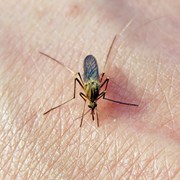 Sergey YAkovlev/PhotoSpin
Sergey YAkovlev/PhotoSpin
Does the mere mention of the West Nile virus have you running for mosquito repellent?
Unfortunately, what was once an issue thought to live in other parts of the world has made quite the landing in the United States.
According to the Centers for Disease Control (CDC), this is the largest outbreak since it was first discovered in American in 1999.
Here are five facts to know about this virus in order to protect your family.
1. The West Nile virus is spread through mosquitoes who pick it up from infected birds, unlike Lyme disease which is spread through the deer tick.
Protect yourself from mosquitoes by avoiding dawn and twilight hours when mosquitoes appear more prevalent. Discourage mosquito breeding by avoiding or removing standing water.
2. The majority of people who are infected do not have any symptoms. However some develop a fever and fatigue, while others go on to develop neurological problems. If symptoms are going to develop, they typically begin within two weeks of exposure.
3. For someone who has symptoms, there is a West Nile antibody test that can be run through the blood. In cases where someone has neurologic symptoms, the doctor may opt to test through the cerebrospinal fluid.
4. Treatment is difficult as this is a virus, and cannot be killed like a bacteria. As most people are asymptomatic or have a fever, it is only when more severe symptoms occur, such as meningitis, that people need treatment.
It is important to note that having a fever is one thing. If it does not improve or worsens and symptoms progress to a stiff neck, confusion, severe headache, tremors or worse -- get to a hospital immediately.
5. While Texas appears to be the state hit the hardest, the virus has been found in the majority of states. Nobody is immune.
Remember that 2012 appears to be a bad year for the West Nile virus so prevention is key by avoiding mosquitoes. If avoidance isn't successful and you contract the virus, then seek medical care if symptoms do not improve or worsen.
References:
1. 2012 West Nile virus update: as of August 21. Web. 26 August, 2012.
http://www.cdc.gov/ncidod/dvbid/westnile/index.htm
http://www.cdc.gov/ncidod/dvbid/westnile/wnv_factSheet.htm
2. Outbreak of West Nile Virus May Be Worst Ever. Web. 26 August, 2012.
http://www.medscape.com/viewarticle/769583
Reviewed August 27, 2012
by Michele Blacksberg RN
Edited by Jody Smith






Add a CommentComments
There are no comments yet. Be the first one and get the conversation started!